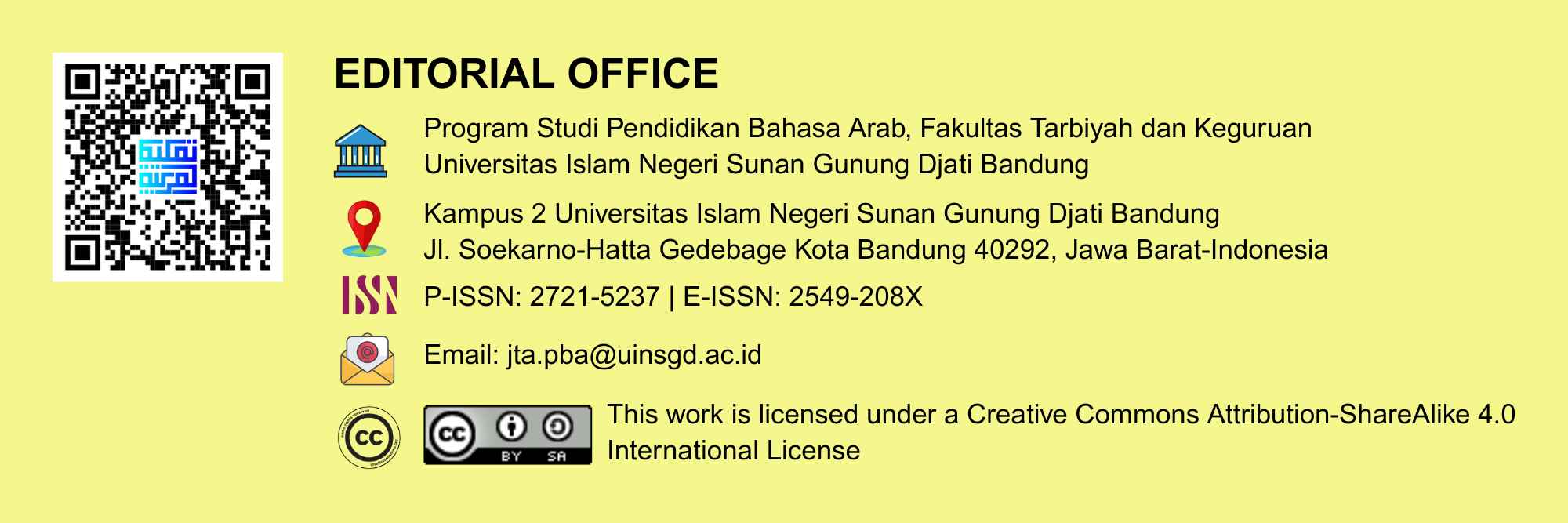Arabic Language Learning Curriculum Islamic Boarding School System
DOI:
https://doi.org/10.15575/jpba.v4i2.9985Abstract
This article aims to find out about the Arabic language curriculum development model at Madrasah Aliyah Al-Falah Gorontalo. This research uses the type of field research or field research. The research method is descriptive qualitative, namely research on the Arabic language learning curriculum's description with the boarding school system at MA al-Falah Gorontalo. The results of this study explain that: curriculum development at Madrasah Aliyah al-Falah Gorontalo is based on several foundations, namely juridical, psychological, and sociolinguistic foundations. Meanwhile, the curriculum development model used in Madrasah Aliyah al-Falah Gorontalo has been analyzed using an administrative model and a grassroots model. The characteristics of learning Arabic in the boarding school system at Madrasah Aliyah Al-Falah are different from learning in other schools. What distinguishes this Madrasah from other schools in the curriculum used and uses the Islamic boarding school system. So that learning Arabic is not only taught in schools but also trained in dormitories.
References
Abdussalam, Aam. (2014). Teori Sosiologi Islam (Kajian Sosiologis terhadap Konsep-konsep Sosiologi dalam Alquran Al-Karim). Ta’lim.
Abidin, Z., & Satrianingsih, A. (2018). Perkembangan dan Masa Depan Bahasa Arab. Diwan : Jurnal Bahasa Dan Sastra Arab. https://doi.org/10.24252/diwan.v3i2.4459.
Ainin, Moch. (2017). Metodologi Penelitian Bahasa Arab. CV. Bintang Pustaka.
Ainin, Moh. (2019). Pengembangan Kurikulum Dalam Pembelajaran Bahasa Arab. Lisan Arabi.
Aliyah, A. (2018). Pesantren Tradisional Sebagai Basis Pembelajaran Nahwu Dan Sharaf Dengan Menggunakan Kitab Kuning. Al-Ta’rib : Jurnal Ilmiah Program Studi Pendidikan Bahasa Arab IAIN Palangka Raya. https://doi.org/10.23971/altarib.v6i1.966.
Almu’tasim, A. (2018). Menakar Model Pengembangan Kurikulum Di Madrasah. At-Tuhfah, 7(2), 1–19. https://doi.org/10.36840/jurnalstudikeislaman.v7i2.140.
Ardiansyah, Ade Arip. (2020). Trial Use of Inquiry Methods in Learning to Write Arabic in Junior High School Santi Asromo Majalengka. Alsuna: Journal of Arabic and English Language, 3(1), 56–65. https://doi.org/10.31538/alsuna.v3i1.706.
Fatoni, A. (2019). Arabic Learning for Academic Purposes. Izdihar : Journal of Arabic Language Teaching, Linguistics, and Literature, 2(2), 149. https://doi.org/10.22219/jiz.v2i2.10096.
Ghafir, A. (2016). Sekilas Mengenal At-Tafsir Al-Adabi Al-Ijtima’i. Al-AhkÄm, 1(1), 25–34. http://ejournal.iainsurakarta.ac.id/index.php/al-ahkam/article/download/102/66.
Hendra, F. (2018). Peran Organisasi Mahasiswa Dalam Meningkatkan Mutu Pembelajaran Keterampilan Berbahasa Arab. Arabiyat : Jurnal Pendidikan Bahasa Arab Dan Kebahasaaraban, 5(1). https://doi.org/10.15408/a.v5i1.7480.
Husin, N. B. (2014). Analisa Kesalahan Pelajar Dalam Penulisan Bahasa Arab: Menulis Resume. International Research Management and Innovation Conference.
Khasanah, N. (2018). Desain Pengembangan Kurikulum Pembelajaran Bahasa Arab Berbasis Pendekatan Potensi/ Fitrah. Al MahÄra: Jurnal Pendidikan Bahasa Arab, 4(2), 159–180. https://doi.org/10.14421/almahara.2018.042-01.
Ma’arif, A. S. (2018). Sighah Ikhtibarat al-’Arabiyyah fi Dui al-Ikhtibar al-Mutqn (TOAFL). Jurnal Al Bayan: Jurnal Jurusan Pendidikan Bahasa Arab, 9(2). https://doi.org/10.24042/albayan.v9i2.2233.
Muhtifah, L., & Muskania, R. T. (2019). The Design on Quality System Model of FTIK IAIN Pontianak in SNPT 2015 and QMS ISO 9001:2015. Jurnal Pendidikan Islam. https://doi.org/10.14421/jpi.2018.72.383-404.
Muhzin Nawawi, M. N. (2017). Pengembangan Kurikulum Pendidikan Bahasa Arab. An Nabighoh Jurnal Pendidikan Dan Pembelajaran Bahasa Arab, 19(1), 85. https://doi.org/10.32332/an-nabighoh.v19i1.759.
Musthafa, I., & Hermawan, A. (2018). Metodologi Penelitian Bahasa Arab (Konsep Dasar, Strategi, Metode, Teknik). PT Remaja Rosakarya.
Nasution, S. (2016). Pengembangan Kurikulum Bahasa Arab Di Madrasah Berbasis Karakter. Bahasa Dan Seni, 44(2), 135–148.
Nurcholis, A., & Salaeh, B. (2019). Epistimologi Kurikulum Bahasa Arab Di Sekolah Menengah Mutawasitah Piraya Nawin Klonghin Wittaya Patani Thailand Selatan. Arabi : Journal of Arabic Studies, 4(1), 75–86.
Nurjannah. (2018). Analisa Kebutuhan Sebagai Konsep Dasar Dalam Pengembangan Kurikulum Bahasa Arab di MAN Curup. 2(1).
Nuryani. (2015). Implementasi Kurikulum Pendidikan Bahasa Arab (Studi Kasus Di Fak . Tarbiyah Jurusan PBA IAIN Tulungagung). Ta’allum, 03(02), 253–277.
Pusat Bahasa Kemdikbud. (2016). Kamus Besar Bahasa Indonesia ( KBBI ). Kementerian Pendidikan Dan Budaya.
Qodri, M. (2019). Arabic Language Test in the Perspective of Competency-Based Curriculum for Students of Madrasah Aliyah Negeri 3 Malang. Izdihar : Journal of Arabic Language Teaching, Linguistics, and Literature, 2(2), 115. https://doi.org/10.22219/jiz.v2i2.10003.
Stošić, L. (2015). The importance of educational technology in teaching. International Journal of Cognitive Research in Science, Engineering and Education.
Syafei, I., & F Ramdhan, D. (2018). Arabic Learning Model Development In Improving Reading Skill. INFERENSI, 12(2), 283–306.
Thu’aimah, R. A. (2010). Al MahÄrat Al Lughowiyah MustawayÄtuhÄ TadrÄ«suhÄ Shu’ubÄtuhÄ. Dar Al Fikr.
Ubaidillah, U. (2020). MafhÅ«m Al Ummah FÄ« Al QurÄn Al KarÄ«m. Ta’lim Al-’Arabiyyah: Jurnal Pendidikan Bahasa Arab & Kebahasaaraban, 3(2), 195–208. https://doi.org/10.15575/jpba.v3i2.8177.
Wekke, I. S. (2015). Tradisi Pesantren Dalam Konstruksi Kurikulum Bahasa Arab Di Lembaga Pendidikan Minoritas Muslim Papua Barat. Karsa: The Journal of Social and Islamic Culture. https://doi.org/10.19105/karsa.v22i1.549
Yauri, A. R., Kadir, R. A., Azman, A., & Azmi Murad, M. A. (2012). Quranic-based concepts: Verse relations extraction using Manchester OWL syntax. Proceedings - 2012 International Conference on Information Retrieval and Knowledge Management, CAMP'12. https://doi.org/10.1109/InfRKM.2012.6204998.
Yusuf, E. (2018). Implementasi Kurikulum Bahasa Arab Di Perguruan Tinggi Agama Islam (PTAI) Di Indonesia. Tarling : Journal of Language Education. https://doi.org/10.24090/tarling.v1i1.1121.
Zubaidi, A. (2015). Model-Model Pengembangan Kurikulum Dan Silabus Pembelajaran Bahasa Arab. Cendekia: Jurnal Kependidikan Dan Kemasyarakatan. https://doi.org/10.21154/cendekia.v13i1.240
Downloads
Published
How to Cite
Issue
Section
Citation Check
License
Authors who publish in Ta'lim al-'Arabiyyah: Jurnal Pendidikan Bahasa Arab dan Kebahasaaraban agree to the following terms:
- Authors retain copyright and grant the journal right of first publication with the work simultaneously licensed under a Creative Commons Attribution-ShareAlike 4.0 International (CC BY-SA 4.0) License that allows others to share the work with an acknowledgment of the work's authorship and initial publication in this journal.
- Authors are able to enter into separate, additional contractual arrangements for the non-exclusive distribution of the journal's published version of the work (e.g., post it to an institutional repository or publish it in a book), with an acknowledgment of its initial publication in this journal.
- Authors are permitted and encouraged to post their work online (e.g., in institutional repositories or on their website) prior to and during the submission process, as it can lead to productive exchanges, as well as earlier and greater citation of published work (See The Effect of Open Access).
![]()
Ta'lim al-'Arabiyyah: Jurnal Pendidikan Bahasa Arab dan Kebahasaaraban is licensed under a Creative Commons Attribution-ShareAlike 4.0 International License.
Based on a work at https://journal.uinsgd.ac.id/index.php/Talim








